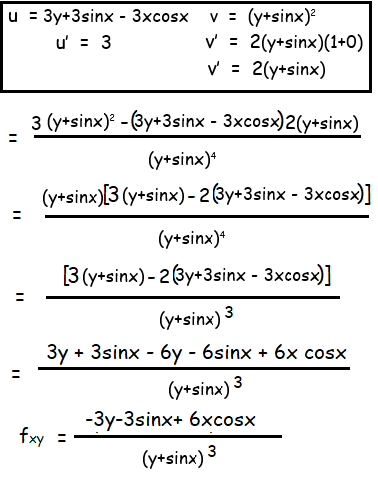FIND fxy and fyx USING PARTIAL DERIVATIVE OF A FUNCTION
Subscribe to our ▶️ YouTube channel 🔴 for the latest videos, updates, and tips.
When we find partial derivative of F with respect to x, we treat the y variable as a constant and find derivative with respect to x .
That is, except for the variable with respect to which we find partial derivative, all other variables are treated as constants. That is why we call them as “partial derivative”.
If F has a partial derivative with respect to x at every point of A , then we say that (∂F/∂x) (x, y) exists on A.
Note that in this case (∂F/∂x) (x, y) is again a real-valued function defined on A .
For each of the following functions find the fx and fy and show that fxy = fyx
Problem 1 :
f (x, y) = 3x/(y+sinx)
Solution :
f (x, y) = 3x/(y+sinx)
Finding fx :
Differentiate with respect to x. Treat y as constant.
u = 3x and v = y+sinx
u' = 3 and v' = 0+cosx ==> cosx
fx = [(y+sinx)(3) - 3x(cosx)]/(y+sinx)2
fx = [3y+3sinx - 3xcosx]/(y+sinx)2
Finding fxy :
Differentiate with respect to y. Treat x as constant.

Finding fy :
Differentiate with respect to y. Treat x as constant.
u = 3x and v = y+sinx
u' = 0 and v' = 1+0 ==> 1
fy = [(y+sinx)(0) - 3x(1)]/(y+sinx)2
fy = -3x/(y+sinx)2
Finding fyx :
Differentiate with respect to x. Treat y as constant.
u = -3x, v = (y+sinx)2
u' = -3 and v' = 2((y+sinx))cosx
v' = 2cosx(y+sinx)
= [-3(y+sinx)2 -(-3x) 2((y+sinx))cosx]/(y+sinx)4
= (y+sinx)[-3(y+sinx)+6xcosx]/(y+sinx)4
fyx = [-3y-3sinx+6xcosx]/(y+sinx)3
Problem 2 :
f(x, y) = tan-1(x/y)
Solution :
f(x, y) = tan-1(x/y)
Finding fx :
Differentiate with respect to x. Treat y as constant.
fx = 1/(1+(x/y)2) (1/y)
fx = (1/y)/(y2+x2)/y2
fx = y/(x2+y2)
Finding fxy :
Differentiate with respect to y. Treat x as constant.
u = y and v = x2+y2
u' = 1 and v' = 2y
fxy = [x2+y2-y(2y)]/(x2+y2)
fxy = (x2-y2)/(x2+y2) ---(1)
f(x, y) = tan-1(x/y)
Finding fy :
f(x, y) = tan-1(xy-1)
Differentiate with respect to y. Treat x as constant.
fy = [1/1+(x/y)2](-x/y2)
fy = [y2/(x2+y2)](-x/y2)
fy = -x/(x2+y2)
Finding fyx :
Differentiate with respect to x. Treat y as constant.
u = -x and v = x2+y2
u' = -1 and v' = 2x
fyx = [(x2+y2)(-1) - (-x)(2x)]/(x2+y2)2
fyx = [-x2-y2 +2x2]/(x2+y2)2
fyx = (x2-y2)/(x2+y2)2 ---(2)
Problem 3 :
f(x, y) = cos (x2-3xy)
Solution :
Finding fx :
Differentiate with respect to x. Treat y as constant.
fx = sin (x2-3xy)(2x-3y)
fx = (2x-3y)sin (x2-3xy)
Finding fxy :
u = 2x-3y and v = sin (x2-3xy)
u' = 0-3 and v' = cos (x2-3xy) (0-3x)
v' = -3xcos (x2-3xy)
fxy = (2x-3y)(-3xcos) (x2-3xy) + sin (x2-3xy)(-3)
fxy = (2x-3y)(-3xcos) (x2-3xy) + sin (x2-3xy)(-3)
fxy = (2x-3y)(-3xcos) (x2-3xy) - 3 sin (x2-3xy) --(1)
Finding fy :
Differentiate with respect to y. Treat x as constant.
fy = sin (x2-3xy)(0-3x)
fy = -3x sin (x2-3xy)
Finding fyx :
Differentiate with respect to x. Treat y as constant.
u = -3x and v = sin (x2-3xy)
u' = -3 and v' = cos (x2-3xy) (2x-3y)
fyx = -3x cos (x2-3xy) (2x-3y) -3 sin (x2-3xy) --(2)

Apart from the stuff given above, if you need any other stuff in math, please use our google custom search here.
Subscribe to our ▶️ YouTube channel 🔴 for the latest videos, updates, and tips.
Kindly mail your feedback to v4formath@gmail.com
We always appreciate your feedback.
About Us | Contact Us | Privacy Policy
©All rights reserved. onlinemath4all.com

Recent Articles
-
Digital SAT Math Problems and Solutions (Part - 23)
Feb 27, 26 04:01 AM
Digital SAT Math Problems and Solutions (Part - 23) -
Digital SAT Math Problems and Solutions (Part - 22)
Feb 26, 26 08:43 PM
Digital SAT Math Problems and Solutions (Part - 22) -
10 Tricky SAT Math Questions with Answers
Feb 25, 26 08:07 AM
10 Tricky SAT Math Questions with Answers

